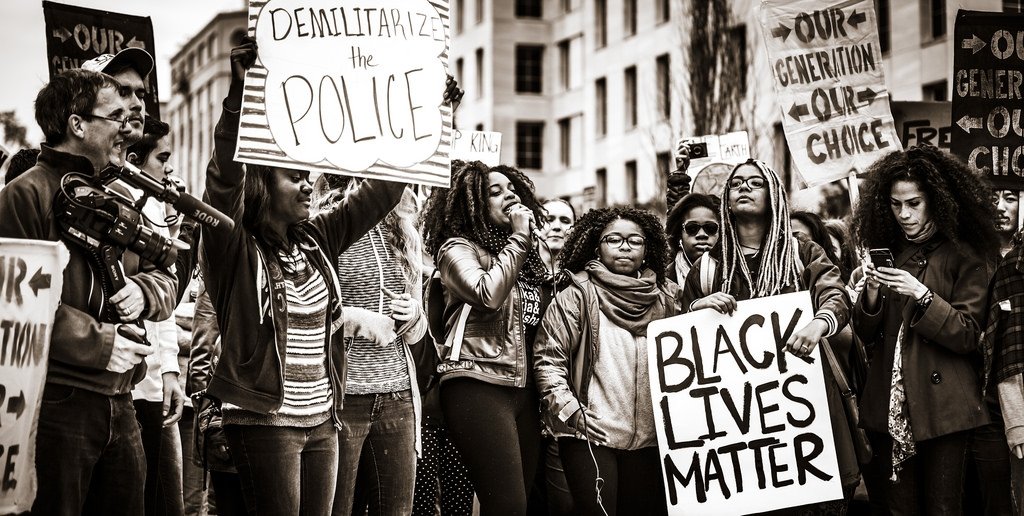Broad Coalition Urges DHS to Release So-Called 'Race Paper'

Original photo by Flickr user Johnny Silver Cloud
Today Free Press joined over 40 civil-rights and civil-liberties groups including the ACLU, Color Of Change and the NAACP in calling on the Department of Homeland Security (DHS) to release an unredacted copy of a document it has internally labeled the “Race Paper.”
The document’s existence came to light as the result of a Freedom of Information Act request focused on federal law enforcement’s surveillance of Black activists — but was released with its text entirely redacted and unreadable.
Detailing their concerns, the groups point to law enforcement’s history of discriminatory practices. The letter states:
“The United States has a long history of monitoring activists of color. During the Civil Rights Movement, federal law enforcement tried to suppress political dissent by targeting Black organizations and leadership through a range of illegal activities.
“The program, COINTELPRO, is now seen as a stain on the history of federal law enforcement and resulted in robust reforms meant to protect against similar future abuses. However, recent reports of police tracking the movements and affiliations of Black and Brown anti-racist protesters represent a chilling mirror of this shameful history.”
Investigating ‘extremist’ ideologies
DHS recently filed a declaration claiming the Race Paper was intended to survey growing trends in domestic terrorism driven by race-related “extremist” ideologies, and to address the co-opting of peaceful protests by violent ideological actors.
Based on this explanation and the known abusive tactics the federal government has employed to combat political dissent in the past, we believe the Race Paper may improperly suggest that protected Black political speech should be considered an indicator of criminal conduct or a national-security threat.
The discovery of the Race Paper is particularly concerning in light of last summer’s leak of the FBI’s “Black Identity Extremist”(BIE) report. That report mischaracterized peaceful, anti-racist groups engaged in First Amendment-protected activity as violent in nature — and therefore worthy of invasive and persistent surveillance.
Like the BIE report, the Race Paper — according to DHS — examines peaceful protests that violent “extremists” have co-opted. But DHS made this assertion even though there’s no evidence that Black activism for racial justice and against police brutality has in fact been co-opted in this manner.
These federal-agency reports aren’t used just at the federal level; they’re also distributed to state and local law enforcement. The FBI distributed its BIE report to 18,000 law-enforcement agencies across the country, some of which have intelligence capacity to collect data on activists and people speaking out.
At a recent Congressional Black Caucus hearing, Dr. Erroll G. Southers, a professor and director of the University of Southern California’s Safe Communities Institute, testified about the impact these reports could have on state and local police.
“When they get a document that speaks to the topic of domestic terrorism,” Southers said, “and they’re given these guidelines on what to look for, this ups the ante in regards to people they come into contact with. … This is quite different than receiving a ‘be on the lookout’ notice. … You can bet that [if a Black activist happens to fit the description of a BIE], it will now get elevated to a level of national security.”
Black activist prosecuted as White supremacist violence goes unchecked
We saw this play out in the case of Rakem Balogun. The FBI detained the Texas resident for six months because he had Facebook posts that criticized police brutality. Balogun is believed to be the first person targeted and prosecuted under the BIE classification.
In December 2017, police stormed his apartment and forced him and his 15-year-old son outside in only their underwear. While Balogun was locked up and denied bail he lost his job, lost his home and missed much of the first year of his newborn daughter’s life.
And while federal law enforcement attempts to fabricate a threat by peaceful Black activists, the real threat of right-wing violence is on the rise.
According to the Anti-Defamation League, White supremacists were responsible for 71 percent of extremist violence over the past decade and constitute the most significant domestic threat in the country.
Yet the DHS documents unearthed by these FOIA requests don’t focus on these documented incidents of actual violence. In fact, Trump has cut funding for the few programs focused on countering far-right extremism.
Transparency is needed
DHS has argued that releasing the Race Paper would cause public confusion.
We disagree. Transparency is vital in determining whether our government is improperly using race or constitutionally protected political activity as an improper and inaccurate indicator of “violent” behavior to justify discriminatory policing. And withholding the documents contributes to a lack of public trust and confidence in federal law enforcement.
The coalition’s letter demands that DHS release the Race Paper immediately. Given our country’s long history of discriminatory policing, the public should not be left to speculate about the content and insinuations hidden in this document. And we need to know how the government is handling our security, our privacy and our constitutionally protected rights.